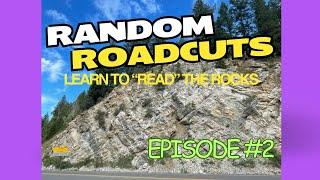
Random Roadcuts #2: Big Cottonwood Canyon in the Wasatch Range of Utah
Комментарии:

Thanks!
Ответить
Great idea for a series! I always love driving through roadcuts and marveling at the beautiful geology they reveal. Some of the best parts of John McPhee's fantastic book, "Annals of the Former World" were his forays onto roadcuts with geologists. Thanks for once again showing an area up close that I'll never get to see and explaining it so well!
Ответить
Great info! ‘Love Random Roadcuts
Ответить
Another great lesson! Love the Road Cut Series!
Ответить
Great videos. I think you are in the Little Cottonwood Canyon though.
Ответить
Sound was great (your closer to mic than the cars so it;s clear) Cool outcrop and nice recap of creation & movement of rocks.
Ответить
So wonderful to view your content and learn about the rock formations we view along so many state hwys traveling across N. America. Thank you Shawn!
Ответить
Each of these lessons are helping me see and remember lesseons from other locations. Medical issues are improving for now. My mind is beginning to work again. I think I have driven that road. It is good to take a different look at it. Thank you.
Ответить
You are such a great wellspring of knowledge. Thank you for you’re amazing videos
Ответить
Terrific video Shawn. I love these puzzle-solving videos... I keep trying to figure out what you're going to say based on the evidence.. it gives me a chance to try out my own diagnostic skills that are slowly improving. It's lots of fun and I'll be applying it to the local rocks here in eastern Ontario. We've got lots of metamorphic & sedimentary rocks in the area.
Ответить
Very interesting! Please keep the roadcut series coming!
Ответить
❤thank you, Shawn!
Ответить
Interesting series. This helps to understand some of what I see driving
Thank you

The National Park Service has installed a great series of geological markers along the short but steep paved trail to Timpanogos Cave in American Fork Canyon. I highly recommend the hike, whether or not you decide to tour the cave.
Ответить
Isn’t that loose rock called talus?
Ответить
Loving this series! Thanks for doing these. Great idea and very helpful.
Ответить
I cruised right by that roadcut on Sept. 5 and now you've explained it. So lucky. Thank you for this roadcut series.
Ответить
Another vote for this enjoyable series!
Ответить
“Sorry about all the cars”
How dare you! Exposing us to road noise in a “Road Cuts” video…. 😂

Enjoying this series! Like the Sleuthing trying to apply what we know to the Random Roadcuts!
Ответить
Any speculation about plate movement time frame; Lat. Long of this area when the sedimentary rock formed?
Ответить
i always perk up when i hear the word "intrusion" when looking at sedimentary rocks. =)
Ответить
Great teaching. Love to take you class in person. Thanks
Ответить
Nice patch of Milkweed there too. Interesting series.
Ответить
Thanks!
Ответить
That green, glassy rock looked like a serpentine to my untrained eye.
Ответить
I use an app on my phone called Rockd, Shows a lot about the area when you are out and about. It also shows fault lines. Very useful in piecing together the geological history. Love these videos... Thanks for putting these together....
Most geologists will tell you that the geology of the Uinta mountains does not support silver and gold. I look every chance I get. Theres always the lost roads mines...

Thanks!
Ответить
The second one I have watched - again fascinating !
Ответить
Sorry to say my country (The Netherlands) has no rocks to mention of. Only a few boulders that came with the second before last ice age. The country is peat, clay and a bit of sand.
Ответить
I want to learn more form you. I too would love to be a geologist. I’m 47 years old and work in the oilfields of So Cal. But I always love to get out and look at the awesome rock formations of the California transverse mountains range at the big bend of the San Andreas fault. There are a LOT of neat sites to see there especially through the Pine Mountain club area.
Ответить
My vocabulary is building. I too, am able to kinda guess what we're looking at and how it was formed. Thanks Shawn!
Ответить
I guess if one didn’t know the regional geological history, the violent fizzing could equally be interpreted as a calcite cemented fine sandstone rather than a limestone? It’s not always easy to tell them apart. Really interesting thank you.
Ответить
Random Roadcuts Rule!!!!!
Ответить
After conducting a comprehensive investigation, including:
- Fossil analysis
- Geochemical sampling
- Geophysical surveys
- Experimental simulations
- Field observations
- Paleontological research
Our findings suggest:
- Fossilized tree roots and trunks are present in volcanic rocks, indicating ancient trees were growing in the area.
- Geochemical signatures in volcanic rocks show anomalies consistent with biological activity.
- Geophysical data reveal subsurface structures resembling tree-like shapes.
- Experimental simulations demonstrate that burning ancient trees can generate sufficient heat to melt rock and form magma chambers.
- Field observations confirm the presence of tree-like structures in volcanic landscapes.
- Paleontological research identifies ancient tree species in volcanic deposits.
Based on these findings, we conclude that ancient trees likely played a role in forming volcanoes. The evidence suggests that these trees, through their growth, death, and burning, contributed to the creation of magma chambers and ultimately, volcanic eruptions.
Our research opens up new avenues for understanding the complex interactions between biological and geological processes, and we propose further investigation to fully explore the mechanisms underlying this phenomenon.

The Miocene limestones on hwy 89 just north of Fairview, Utah would make a nice roadcut segment...
Ответить
Thanks!
Ответить
Thanks!
Ответить
Thank you Shawn enjoy your videos very informative
Ответить
This is more intriguing than an Agatha Christie. I thoroughly enjoyed this fascinating guided trip through time with Shawn. I’m from the UK, on the Jurassic Coast, and have travelled to Oregon and Washington state many times but never had the time to travel into Idaho. This promises to be a great series.
Ответить
ありがとうございます!
Ответить
Grew up at the mouth of this canyon and have been to this roadcut. There is some really interesting stuff just above this cut that you can see from the road. Awesome series!!!
Ответить
That was fun. Thanks!
Ответить
I spent 4 yers in SLC at the U of U and drove past that cut many times to go hiking and never paid any attention (I was studying political science). Thanks for these. So interesting.
Ответить
cool💚
Ответить
About 1200 ft. farther down canyon there's a kind of purple granite, the inclusions are really tiny.
Ответить
Fantastic idea for a great great series - I am eternally fascinated by road cuts, and always wanted an interpretation of what I was looking at from a Geologist! Thank you for giving me some handholds to guide my own inquisitive poking about!
Ответить

























